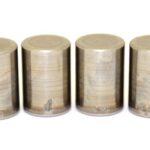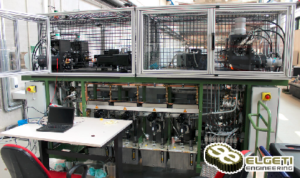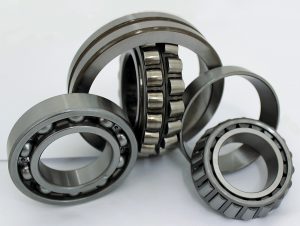Properly considering the influence of shaft bending when testing bearings

Bearings in planetary gears, hydraulic pumps and others are frequently exposed to conditions where elastic deformations in their surrounding parts lead to significant misalignment of the rings towards each other. Such misalignment results in local pressure peaks and an associated reduction of bearing life. Proper raceway crowning lessens these effects and is therefore a highly relevant consideration during supplier approval.
The influence of local stresses can be considered during the design process but also needs to be taken into account during testing if bearing performance is to be verified on a test rig. Here, the acceleration of test runs can complicate the situation. Typically, test loads are higher than application loads because years of service life must be represented by weeks on a test bench. When investigating the effect of misalignment, the chosen testing conditions must lead to non-uniform stress distributions similar to those expected in the application.
When testing, the degree of misalignment can be controlled with the use of customized fixtures. However, it is always important to verify that the test conditions adequately mimic the application. The FVA Workbench is a powerful tool that can calculate local stresses both for the application and the test case.This article shall show a general approach to testing for applications where significant misalignment in the bearings is expected
Bearing life testing for bearing distributors

Bearings are a globally sourced commodity. As such, quality control of regular deliveries as well as the evaluation of new suppliers is highly important. Bearing trading companies who work independently from specific brands constantly need to optimize their supplier base, which means reducing costs without jeopardizing the quality. Quality control is even more critical when selling bearings under the house brand. Additionally, customers need to be convinced that the alternative product will meet the requirements of their applications.
Experimental high frequency analysis of electric impedance of rolling bearings

When scientific research aims to break down the existing limits of machine elements, the associated equipment must meet the highest demands. Professor Kirchner and his team at the Technical University of Darmstadt (TUD) intend to use the electrical properties of rolling contact bearings for various purposes, including as sensors. This endeavor poses two particular challenges: measuring the bearing’s impedance at high frequency and understanding how the associated high frequency electric currents might impact bearing life. For this purpose, Elgeti Engineering GmbH built a special test rig which is capable of applying and measuring high frequency electric currents and voltages on all four of its stations.
The first research results were announced at the BearingWorld International Conference in October 2020. We are very pleased to share the associated article and are proud to support the highest level of academic research. Many thanks to Georg Martin, Tobias Schirra, and Prof. Dr. Eckhard Kirchner for the excellent collaboration and good luck with the further research!
How after-sales-services like preventive maintenance can enhance the competetiveness of bearing distributors

When selecting a bearing supplier for industrial machinery, one typically needs more than just a bearing. In fact, what one really needs is a three-tiered service consisting of application engineering, the bearing itself, and preventative maintenance services such as diagnostics and condition monitoring. Operators of industrial plants such as steel mills and tire factories in particular rely on these services when working with the premium manufacturers.They appreciate their advice before buying and know they are in good hands if a problem were to arise.In collaboration with competent engineering companies, however, independent bearing distributers can meet or even outperform this level of customer service. The strength of bearing distributers is finding cost-efficient and reliable solutions while after-sales-services like preventive maintenance can generate further profitable business.
